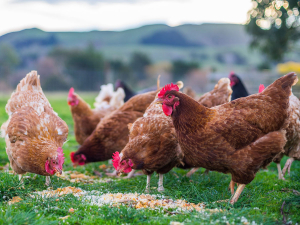Restrictions on fruits, vegetables movement in Mt Roskill
Legal controls on the movement of fruits and vegetables are now in place in Auckland’s Mt Roskill suburb, says Biosecurity New Zealand Commissioner North Mike Inglis.
 Over the weekend, test results confirmed the virus had spread to the final layer shed, something Anderson says was not unexpected.
Over the weekend, test results confirmed the virus had spread to the final layer shed, something Anderson says was not unexpected.
Biosecurity New Zealand says continued testing and monitoring shows no signs of avian influenza outside of Mainland Poultry’s Hillgrove, Otago farm.
Depopulation efforts are currently underway and are expected to be completed today, says Biosecurity New Zealand deputy director-general Stuart Anderson.
The farm remains under a strict biosecurity lockdown.
“The depopulation to date covers all four layer sheds, which held a capacity of 160,000 chickens in total,” Anderson says. “We’ve had an animal welfare specialist on site to observe depopulation operations.”
Over the weekend, test results confirmed the virus had spread to the final layer shed, something Anderson says was not unexpected.
“We had already planned to depopulate this shed before those results came in as we knew that spread was almost certain,” he says.
A separate facility on the farm, away from the layer sheds and housing 40,000 rearing chickens, will also be cleared.
The depopulation of that facility will begin today.
“International experience tells us there is no other way to manage the risk of spread of this virus other than full farm depopulation, followed by cleaning, and decontamination,” Anderson says.
“We’ve moved quickly in the past week to put in restrictions, investigate, track, and test, and I thank the farmer involved and our industry partners for their help – together we’ve made strong progress,” he adds.
Over 1,200 samples have been received to date, with hundreds still being analysed at a time in Biosecurity New Zealand’s PC3 laboratory in Wallaceville in Wellington.
The response team has over 200 staff members across the Ministry for Primary Industries.
“We continue to put significant resource into eliminating H7N6, and we are confident we are on the right track to stamp it out,” says Anderson.
There remains no risk to eggs and chicken supply in New Zealand given the size of the national flock, nor any issues for food safety, and the risk to human health remains low.
Keratin biomaterials company Keraplast and Wools of New Zealand have signed a new superpremium wool contract which is said to deliver a boost to wool growers.
While things are looking positive for the red meat sector in 2026, volatility in global trade remains a concern, says the Meat Industry Association (MIA).
The quest to find innovative practical, scientific solutions to deal with water-related issues at a catchment level has been the theme of an important conference at Massey University last week.
One of the country's top Māori farms faces a long and costly rebuild to get the property back to where it was before recent storms ripped through it.
The latest Global Dairy Trade auction results have delivered a boost to dairy farmers.
New Zealand potato growers are prioritising value creation from high yields to meet a complex mix of challenges and opportunities, says Potatoes NZ chief executive Kate Trufitt.

OPINION: First on the scene after the recent devastating storms in parts of the North Island were emergency services and selfless…
OPINION: Why can't Christopher Luxon stand up to Winston Peters over the latter’s high-profile attack on the proposed Indian FTA?